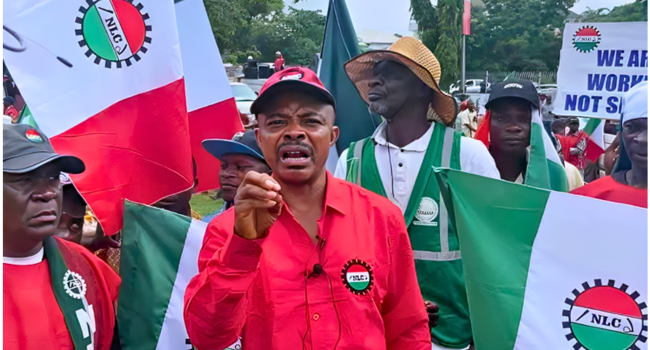The Nigeria Labour Congress (NLC) is NOT playing around! They’ve just issued a fiery warning, drawing a clear line in the sand against a controversial plan brewing in the National Assembly (NASS). And what’s got them so riled up? It’s the audacious idea of removing crucial labor matters – especially the minimum wage – from the Federal Government’s exclusive legislative list!
Can you feel that tension? This isn’t just a policy debate; it’s a battle for the very livelihood of Nigerian workers, and the NLC is vowing to resist any such attempt with everything they’ve got. This could get very ugly, very quickly!
The Spark: Shifting Minimum Wage Control
So, what exactly is happening? The National Assembly is reportedly considering a move to shift “labour matters” – which critically includes the minimum wage – from the exclusive legislative list of the Federal Government to the concurrent list.
Now, let’s break down what that means, because it’s super important:
- Exclusive Legislative List: This is where the Federal Government has sole power to make laws. Think of it as a “federal only” zone. When minimum wage is here, it means there’s a single, national minimum wage set by the federal government that applies across the entire country. This provides a uniform standard for workers, no matter which state they live in.
- Concurrent Legislative List: This is where both the Federal Government and individual states can make laws. If minimum wage moves here, it means that each of Nigeria’s 36 states (and the FCT) would then have the power to determine their own workers’ wages.
And that is precisely what the NLC is furious about!
The NLC’s Fiery Vow: “We Will Resist!”
The Nigeria Labour Congress, representing millions of workers across the country, sees this proposed shift as a direct threat to the welfare and rights of laborers. They have wasted no time in making their stance unequivocally clear: they have vowed to resist any attempt by the National Assembly to push this plan through.
Why such a strong reaction? Because for the NLC, a national minimum wage is a fundamental protection. It ensures a baseline income for all workers, preventing states from engaging in a “race to the bottom” where they might compete by offering lower wages to attract businesses, ultimately exploiting workers. If states are allowed to set their own wages, it could lead to:
- Wage Disparity: Massive differences in minimum wages across states, creating economic inequality and potentially driving internal migration.
- Worker Exploitation: Weaker states or those with less political will might set extremely low wages, leaving workers vulnerable.
- Erosion of Workers’ Rights: It could weaken the collective bargaining power of unions and make it harder to advocate for better conditions nationwide.
- Increased Hardship: In a country already grappling with high inflation and cost of living, a fragmented and potentially lower minimum wage could push more families into poverty.
The NLC’s “vow to resist” isn’t just empty rhetoric. This union has a long history of mobilizing its members, organizing protests, strikes, and mass actions that can bring the country to a standstill. They are a formidable force, and when they say they will fight, they mean it. This sets the stage for a potentially massive confrontation between organized labor and the legislative arm of government.
Why Now? The Context of Economic Hardship
This proposed move by the NASS comes at a particularly sensitive time for Nigerian workers. The country has been grappling with severe economic challenges, including:
- High Inflation: The cost of living has skyrocketed, making it increasingly difficult for average families to afford basic necessities.
- Fuel Subsidy Removal: This has led to a significant increase in transportation costs, impacting workers’ disposable income.
- Currency Devaluation: The naira’s depreciation has eroded purchasing power, making salaries worth less.
In this context, the minimum wage is not just a number; it’s a lifeline for millions. Any attempt to decentralize or potentially reduce it is seen as an attack on the already struggling workforce. The NLC’s strong stance reflects the deep anxiety and frustration among workers who feel their economic well-being is under constant threat.
This looming battle between the NLC and the National Assembly is a critical one for Nigeria’s future. It will test the power of organized labor, the responsiveness of the legislature, and ultimately, the commitment to social justice and worker welfare in the country. Get ready, because the fight for the minimum wage just got a whole lot more intense!


